| Srl | Item |
| 1 |
ID:
118562
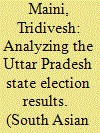

|
|
|
| 2 |
ID:
124356
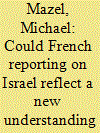

|
|
|
|
|
| Publication |
2012.
|
| Summary/Abstract |
The media in France show an inordinate interest in the Middle East and more specifically in the Palestinian issue and Israel. Not a day passes without a news item, an article, and several blog posts on the subject. Each year ushers in a new crop of essays on this topic, while other weighty matters, such as human rights in China or the neverending food crisis and endemic corruption in Africa get short shrift. The subject never fails to fascinate the public. Writing about the settlements or the blockade of Gaza will prompt hundreds of talkbacks, a fact well known to editors of websites such as Rue891, which rely heavily on advertising to survive.
|
|
|
|
|
|
|
|
|
|
|
|
|
|
|
|
| 3 |
ID:
108985
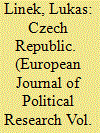

|
|
|
| 4 |
ID:
183652
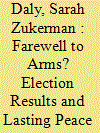

|
|
|
|
|
| Summary/Abstract |
Why does fighting recur after some civil conflicts, whereas peace consolidates following others? The untested conventional wisdom is that—absent safeguards—postwar elections are dangerous for peace because electoral losers will reject the election results and remilitarize. New cross-national data on postwar election results and belligerent-level data on remilitarization contest this view. Citizens tend to elect peace because they engage in “security voting”; they elect the party that they deem best able to secure the state, using the war outcome as the heuristic that guides their security vote. Findings indicate that the chance of renewed war increases if there is an inversion in the military balance of power after war, and the war-loser performs poorly in the elections. If, instead, relative military power remains stable, or citizens accurately update their understandings of the postwar power balance, a civil war actor is unlikely to remilitarize if it loses the election. Knowing when and how these belligerent electoral actors choose to either sustain or break the peace informs important theoretical and policy debates on how to harness democracy's benefits while mitigating its risks.
|
|
|
|
|
|
|
|
|
|
|
|
|
|
|
|
| 5 |
ID:
109021
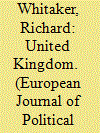

|
|
|
| 6 |
ID:
109022
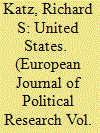

|
|
|
| 7 |
ID:
146193
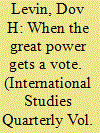

|
|
|
|
|
| Summary/Abstract |
What are the electoral consequences of attempts by great powers to intervene in a partisan manner in another country’s elections? Great powers frequently deploy partisan electoral interventions as a major foreign policy tool. For example, the U.S. and the USSR/Russia have intervened in one of every nine competitive national level executive elections between 1946 and 2000. However, scant scholarly research has been conducted about their effects on the election results in the target. I argue that such interventions usually significantly increase the electoral chances of the aided candidate and that overt interventions are more effective than covert interventions. I then test these hypotheses utilizing a new, original dataset of all U.S. and USSR/Russian partisan electoral interventions between 1946 and 2000. I find strong support for both arguments.
|
|
|
|
|
|
|
|
|
|
|
|
|
|
|
|